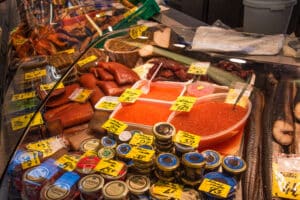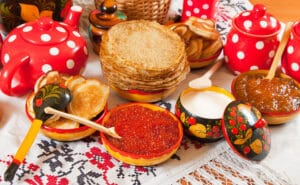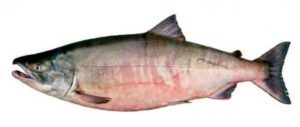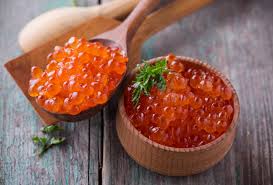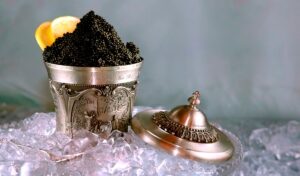Olga below describes the place of caviar in Russian food culture. In simplified Russian, she describes where the delicacy is harvested from, the major types of caviar, and how the types differ in cost and quality. We also provide an English primer below discussing more of the history of caviar, how it is eaten and consumed in other Eurasian states, and where to find it in the US.
This can be considered a continuation of our discussion of food culture that began with a blog entry on mushroom hunting and another on mushroom preparation and consumption.
This resource is part of a series of free Russian lessons sponsored by SRAS called Olga’s Blog. The blog documents – in simplified, modern Russian – Olga’s experience finishing high school, starting college, and living life in Moscow in 2006-2007. The text (including the prices given), links, and format of this resource were last updated in 2024.
Briefly on Caviar in Eurasian Food Culture
Caviar is often associated with the super wealthy and is often associated with Russian culture. While both assumptions are true, the full reality is much more complex.
Caviar is widely consumed and enjoyed in Russia. However, black caviar as we know it today originated around the Caspian and Black Seas where there are several sturgeon species that produce the prized eggs. Although Russia now borders these areas, it first reached them only in the 17th century. Before that, there are Persian documents that indicate the delicacy was definitely consumed in that area in the 13th century. Greek documents show that the ancient Greeks may have been importing it from the Black Sea coast around modern Georgia in the 3rd century.
Overall, eggs can make up a significant portion of a fish’s mass. The eggs can be safely consumed raw, so long as they are consumed fresh, and are packed with vitamins and energy-rich fats and are nearly 25% protein. Thus, it is probably safe to infer that the consumption of fish eggs is probably about as old as the consumption of fish itself.
Today, caviar is widely enjoyed in Russia – particularly at weddings and on holiday tables, especially for Maslenitsa and New Year. It’s also still very widely eaten in the Caspian region, especially in Turkmenistan, and across the Caucasus – in Georgia and Azerbaijan caviar production is referred to as a promising area of economic development. Elsewhere, in the Baltics, whose cuisine is fish-heavy, visitors are often taken aback by the amount and variety of caviars that can be found in local markets.
Caviar can be eaten straight, but in all of these locations, it is most commonly served on white baguette bread or crackers, often with a generous spread of butter.
While black caviar is quite expensive, red caviar, which comes from common salmon, can be relatively inexpensive. Black caviar can be found in America at stores that specialize in Eurasian imports and at upscale supermarkets that cater to health-conscious people. Whole Foods even offers information explaining caviar and how to eat it. Most caviars in the US are imported – but there is some domestic caviar production as well.
Meanwhile, some Americans may have some experience with red caviar from certain types of sushi. However, it’s much rarer to find outside of specialty import stores because its main draw is that it is relatively inexpensive, a quality that generally assumes that certain economies of scale can be used. These require wide demand and a large, well-maintained supply. While this is possible in places such as Russia, it is not America, where the highly nutritious food is little-known and rarely consumed.
Caviar in Russian Cuisine and Culture: Simplified Russian Text from Olga’s Blog
This is Lesson 15 of Olga’s Blog, a series of intermediate Russian lessons.
Note that:
- All of the bold words and phrases have annotation below.
- Red words and phrases indicate the subject of this blog entry’s grammar lesson.
- *Asterisks indicate slang.
Дорогие друзья!
Многие американцы думают, что икра – это экзотическая еда богачей, которую едят серебряными ложками из серебряных тарелок. А на самом деле, для россиян икра хоть и деликатес, но ее часто едят не только олигархи, но и обычные люди, например водители и фермеры.
В основном икру поставляют с Камчатки, места, которое тоже можно назвать экзотическим. Камчатка – это полуостров на краю России, куда добраться можно по воздуху или морем, где дымятся вулканы, бьют горячие ключи, с гор текут чистые реки, и медведей больше чем коренных жителей, откуда до Аляски и Японии ближе, чем до Москвы.
Знаменита она еще одним удивительным явлением. В конце лета местные реки заполняются рыбой (кета, горбуша, семга), идущей на нерест в их верховье. Рыбы настолько много, что кажется, ее больше, чем воды. Во время путины на речных берегах скапливается много техники для ловли рыбы и грузовых машин для ее перевозки. Путина длится всего несколько дней, и ее ждут не только рыбаки, но и медведи и хищные птицы. Рыбу ловят тоннами. Ее просто черпают из воды.
Самая вкусная икра – икра горбуши, у кеты красная икра крупная, и ценится дороже.
Главная ценность в рыбе это икра. Количество икры в рыбе доходит до одной девятой, одной шестой от её веса*. Мнение о том, что икра ужасно дорогая, это полная неправда. Конечно, знаменитая белужья икра стоит немало. Самый маленький контейнер, в котором продается эта премиальная черная икра, содержит пятьдесят граммов и стоит около одного и пятидесяти долларов США. Но можно купить отличную красную лососевую икру примерно за четыре доллара за унцию в России и восемь долларов за унцию в Америке.
Но очень хорошую красную лососевую икру в 100-граммовых баночках можно купить чуть более чем за семь долларов США. А в магазинах с фиксированными ценами в России можно найти даже дешевые 100-граммовые баночки по цене от четырех долларов США. Наиболее популярна икра в маленьких стограммовых жестяных баночках. Их называют таблетками от голода для гурманов.
Это недешево, и вряд ли кто-то станет за такие деньги наедаться до отвала икры каждый день. Но икра остается традиционным блюдом на российских свадьбах и больших праздниках, таких как Новый год. Так что легко найти повод попробовать этот замечательный деликатес!
Икра может быть подана в очень декоративных сосудах для разделки. Однако чаще всего россияне просто выкладывают ее в банку, в которой она продавалась.
Икру можно есть просто ложкой. Однако чаще всего ее намазывают на ломтики багета или на крекеры. Лучше всего она сочетается с толстым слоем сливочного масла.
Давным-давно существовало множество способов приготовления икры, начиная от ее ферментации и заканчивая хранением в полотняных мешочках в контейнерах, наполненных бурой.
Сегодня почти вся икра изготавливается по одному и тому же простому методу – свежую икру промывают, и пересыпают солью. И через несколько дней икра готова к употреблению. На местных заводах ее герметично закрывают в металлические или стеклянные банки, в таком виде она и поступает в магазины.
Баночная икра – продукт уже готовый к употреблению, его не надо готовить. Икра используется в основном для приготовления закусок. Пока!
Vocabulary and Cultural Annotations
Экзотическая еда богачей: Exotic food of the wealthy.
Поставлять/поставить с Камчатки: To ship/supply/procure from Kamchatka.
Добираться/добраться по воздуху или морем: To reach by air or sea. There are no roads to the Kamchatka peninsula. In fact, there is still not a continuous paved road that runs from Moscow in the west to Vladivostok in Russia’s far east.
Бьют горячие ключи: Thermal springs well up. Note that in Russian a spring is usually called a “родник” or “источник.” Here, Olga has chosen a slightly more colorful word more associated with liveliness than with with placid nature. In Russian, the collocation “бить ключом” can also mean “to be in full swing” and “жизнь бьёт ключом” means “life is in full swing.”
Коренные жители: Native peoples. It should probably be mentioned that the majority of the people resident on the peninsula are ethnic Russians, many of them transplanted there during the Soviet resettlement efforts of 1960-1989.
Знаменита она еще одним удивительным явлением: It is famous for one other amazing phenomenon. Note the word order here. “Знаменита” is a short-form adjective placed before the pronoun it modifies. Note that what the noun is famous for is placed in the instrumental case: “одним удивительным явлением.”
Кета: chum salmon; горбуша: humpback salmon; семга: Atlantic salmon. See pictures above. These fish range in average size from 2-3 feet and 3-10 pounds each.
Идущей на нерест в их верховье: going to spawn at the riverhead. Note that “Идущей” is a present participle form of “идти.”
Путина: fishing season. The word derives from the root “путь” meaning “road” or “path” and is so named because it coincides with time the fish are traveling to breed. The name Путин (Putin) also derives from this same root.
Хищная птица: bird of prey (carnivorous bird).
До одной девятой, одной шестой от её веса: up to one-ninth or one-sixth of its weight. The average depends mostly on the type of fish in question.
Двести долларов за унцию: Two-hundred dollars an ounce. Most Russians, of course, do not use the term “ounce,” as Russia uses the metric system. Often this term is encountered when Russians are discussing imported prices or an educated Russian is speaking to a foreigner. Одна унция (one ounce) is equal to about 28.3 grams.
Наедаться / наесться до отвала: To stuff one’s self. An отвал is a trash pit, so the Russian collocation here would imply that one ate essentially everything that was edible and perhaps some that was not.
Бурой – borax. Natually occuring deposits of borax can be found in Turkey and the Caucasus.
Промывать / промыть свежую икру: Thoroughly wash the fresh caviar. “Промывать” can also also mean “flush,” “rinse,” and “purge.” The prefix “про” in this case, implies that the action was thorough. The term “brainwash,” incidentally, is translated as “промывать мозги.”
Пересыпать солью: Sprinkled with salt. Note that in this case, the prefix “пере” indicates the process used to add the salt – by adding a layer of caviar, then sprinkling salt, then adding another layer and sprinkling more salt. If to refer to simply adding a normal amount of salt to soup, for instance, the verbs “насыпать” or “сыпать” are used.
Готова к употреблению: Ready for consumption.
Стограммовая жестяная баночка: A one-hundred gram tin can. Note that “баночка” is a diminutive of “банка,” emphasising that the can is small.
Икра используется в основном для приготовления закусок: Caviar is used mainly in the preparation of appetizers/snacks.
Grammar Focus: Word Formation – Professions, etc.
Various words can be derived from one and the same root by adding different suffixes and prefixes. Many names of professions are derived from verbs associated with those professions. Words that refer to someone who performs an action are also formed in the same way.
Russian typically has male and female versions of these words. There are some exceptions, however, where no female form exists, such as for “носильщик” (porter). Also, for many professions, female forms are now falling into disuse. For example, though the word “руководительница” (female leader/head) exists, one increasingly encounters phrases such as “она хороший руководитель” and this is considered perfectly correct. Knowing when to use one and not the other in the case of female forms can be tricky at times. Generally, the higher the position and the more education attached to obtaining that position, the more likely it is to have taken on a strictly male form. However, this rule is not constant.
-тель
Nouns with the suffix –тель are mainly derived from the stem of the infinitive of a verb. If the person referred to is female, then the suffix –тель is retained and the suffix –ница is additionally added.
Читать (to read) – читатель (reader, male) – читательница (reader, female)
Руководить (to lead) – руководитель (leader, male) – руководительница (leader, female)
-щик, -чик
Nouns with the suffixes –щик, -чик, -щица, -чица are derived from noun and verb stems: Переводить (to translate) – переводчик, переводчица (translator)
Носить (to carry) – носильщик (porter), no female form
-ник
Nouns with the suffix –ник are derived from adjective or nouns stems: Отличный (excellent) – отличник (excellent student), Мясо (meat) – мясник (butcher)
-ик
Nouns with the suffix –ик are generally formed from nouns: Математика (mathematics) – математик (mathematician), История (history) – историк (historian)
Other words have irregular forms such as “рыбак” (fisherman, from the word “рыба“) and “богач” (wealthy person, from the adjective “богатый”).
More Free Russian Lessons From Olga’s Blog

The Language and History of Caviar: Olga’s Blog
Olga below describes the place of caviar in Russian food culture. In simplified Russian, she describes where the delicacy is harvested from, the major types of caviar, and how the types differ in cost and quality. We also provide an English primer below discussing more of the history of caviar, how it is eaten and […]
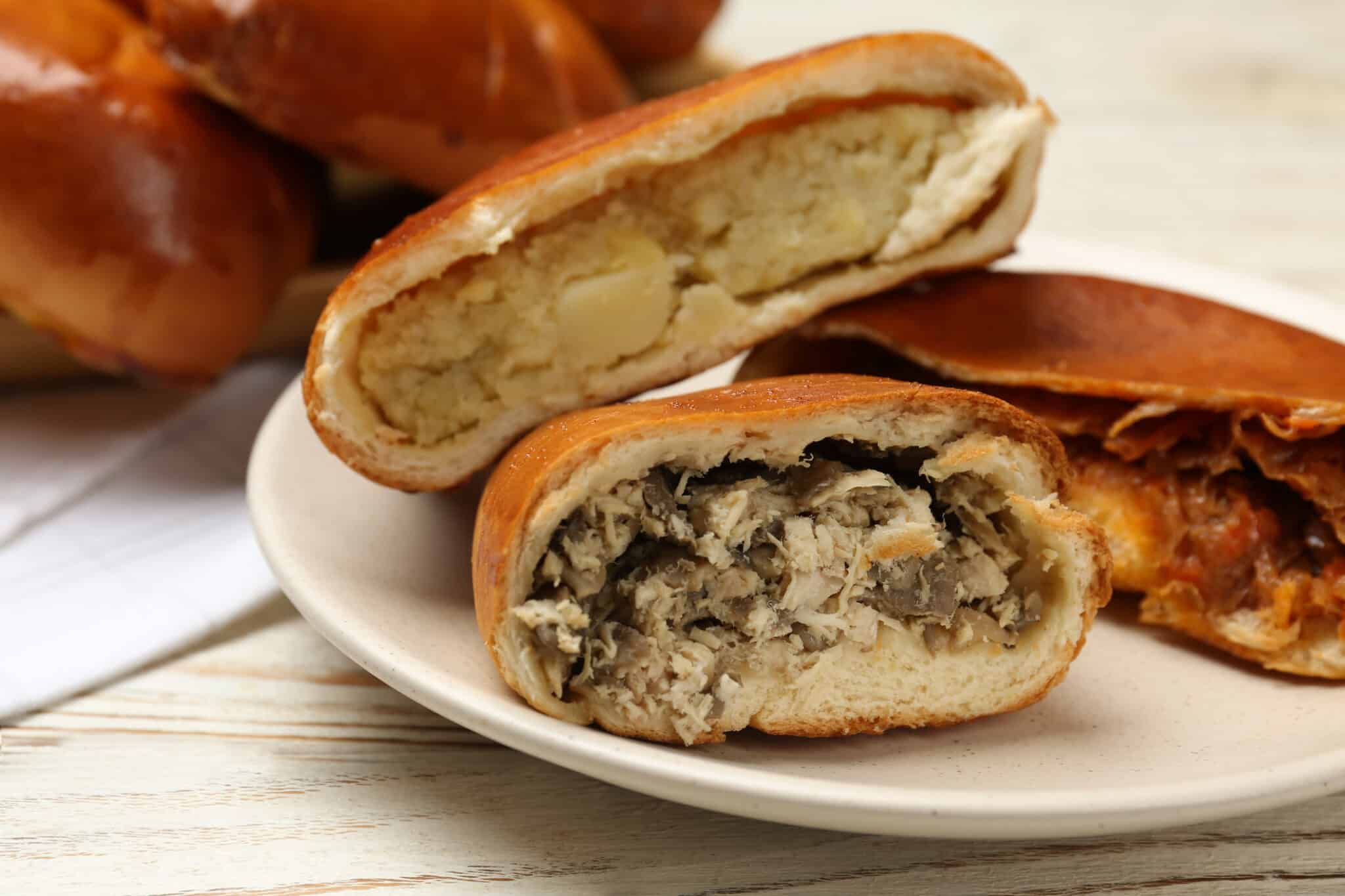
Mushrooms in Cultures and Cuisines: Olga’s Blog
Olga below continues her discussion of the deeply held place that mushrooms have in Russian culture. In part one of this discussion, she focused on how and where and find the mushrooms. In part two, below, she discusses how the mushrooms are preserved, prepared, and consumed. A staple of the regional diet for centuries, mushrooms […]
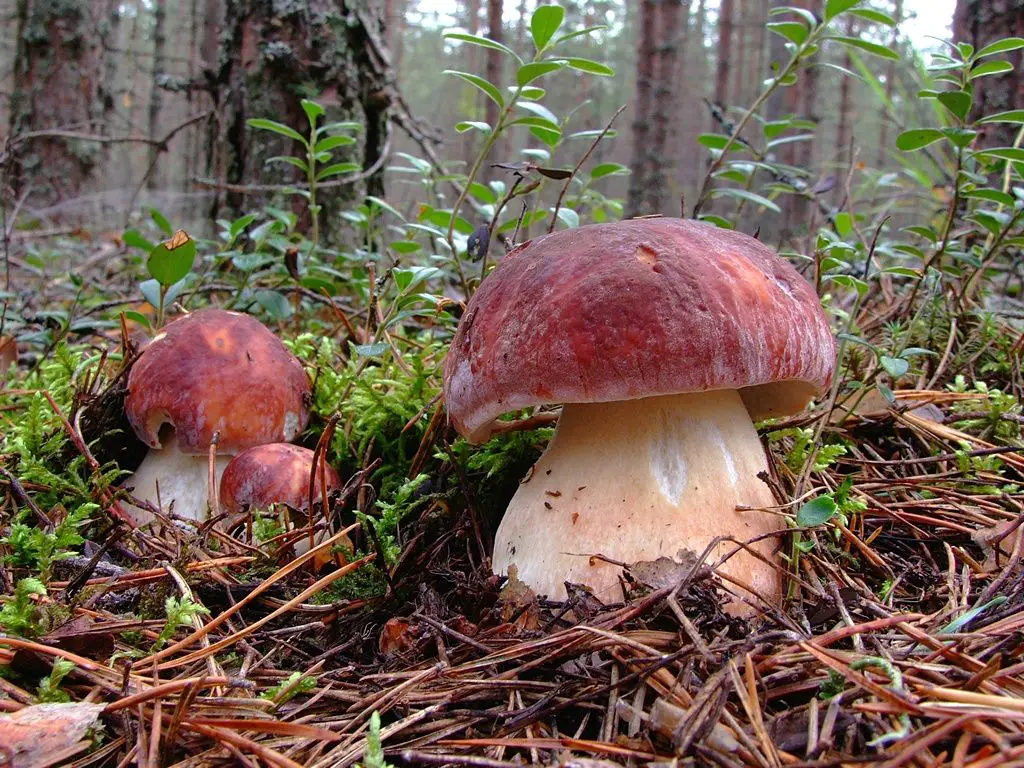
Mushroom Season Has Begun! Olga’s Blog
Olga below discusses the deeply held national tradition of mushroom gathering. An important part of Russian food tradition for many centuries, Russian children are taught in school from an early age to tell the difference between various types of native mushrooms. Many, like Olga, will go with relatives and friends to the woods to put […]

Study Abroad in America for Russians: Olga’s Blog
As part of her major program in international relations at Moscow State University, Olga applied to study abroad in the United States in 2007. As was not uncommon for students applying for study abroad in either direction, Olga hit several bureaucratic snags. What is perhaps most remarkable about the below text, however, is the description […]

What is the First Day of University Like in Russia? Olga’s Blog
Below, Olga discusses what a first year freshman experiences on day one of their college education. The day offers no classes. It is instead filled with speeches, handshakes, and status symbols. All of this is highly indicative of the role of formality and ceremony in Russian education and Russian society. This resource is part of […]

